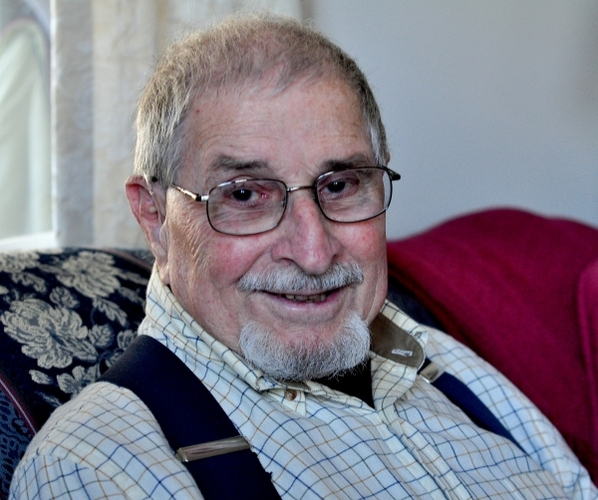BRATTLEBORO — As a disabled World War II combat veteran, Robert Miller knows intimately what those who have served their country in wartime have gone through.
But there is one thing that he has never had to experience, and that is coming back from a war without a home or a job.
“The welcome I had when I returned could not have been better,” he said. “Homelessness and unemployment is a problem that I don't have personal insight with, because of the reception that I, and the rest of the World War II veterans got when we got home.”
“ But now, it seems like the American people are so far removed from war, and not only don't understand what a veteran has gone through, they don't realize how life-shattering, and life-changing, that experience is,” he said.
Doing something about the problem of homelessness is why Miller co-founded Home at Last, Inc., nearly four years ago.
Home at Last is a nonprofit all-volunteer group working to provide permanent housing and support services to homeless veterans.
The organization buys inexpensive mobile homes in established area parks, then renovates and furnishes them for veterans, who put 30 percent of their income toward rent and utility costs.
So far, he said, Home at Last has placed veterans in four homes. The group got a major boost last Thursday, when it was announced it would receive a $10,000 grant from the Vermont Veterans Fund.
Home at Last was one of four organizations providing counseling, housing, and other support services to Vermont veterans who split more than $43,000 raised from a new check-off program on the Vermont state income tax form.
Miller said the money will be used to help purchase another mobile home for a veteran and his or her family.
Home at Last has bought four mobile homes, and Miller said it will take at least another $25,000 to obtain the fifth home.
“The way we do things is that we first find a trailer already hooked up in an existing park, and then we look for an occupant,” Miller said.
The Veterans Administration helps Home at Last find veterans who need a place to live. It also assists with the counseling and support to make sure a prospective tenant is a good fit.
“We work closely, and productively, with the VA,” Miller said. “That's why we have had success.”
According to state officials, it's estimated that as many as 100 veterans on any given night in Vermont do not have permanent shelter.
Nationally, U.S. Department of Veterans Affairs estimates that more than 260,000 military veterans are homeless at some time during any given year.
Home from the war
Miller got acquainted with the problem when he started receiving medical care at the VA hospital in White River Junction.
He was a radio operator in the Army's 36th Division in Italy in 1944 and suffered a head wound in an artillery barrage during the battle for Monte Cassino.
“A hunk of shrapnel from a shell hit me in the head,” Miller said. “Left me deaf as a coot.”
Miller said he was one of the lucky ones to survive what was the deadliest, most brutal battles of the Italian campaign.
“We lost most of our division within a matter of days, and they had to pull us out,” he said.
He started making regular visits to the VA hospital about a decade ago, and it was there that he said he saw “the results of our many wars” and felt a need to do something.
“Homelessness is the end result of a lot of other problems like PTSD [post-traumatic stress disorder], alcoholism, drugs - you name it,” said Miller.
“I have real problems with a country that so blithely sends people off to war, and then undervalues what they went through and they problems they have as a result,” he said.
The hero's welcome that Miller and his contemporaries received after World War II contrasts with the relative indifference that greeted returning vets from subsequent wars.
“In World War II, it was an absolute victory,” said Miller. “In all the wars after that, the result has either been a stalemate, like Korea; a defeat, like Vietnam; or meaningless, like Iraq.”
“And the population has responded accordingly,” he continued. “How else can you explain how the Vietnam vets got treated when they came back?”
But Miller thinks that the biggest problem is that the average American has no idea what war is about.
“We haven't experienced the horrors of war on our soil since the Civil War,” he said. “Think of all the villages in Europe that got destroyed in World War II. They look at war totally differently than Americans do.”
Another campaign
Miller said the fundraising letters for Home at Last's upcoming fund drive will go out this week. He said that he recognizes that many area nonprofits are seeking money, but he hopes that those who gave generously during past appeals will do so again.
At 87, Miller's health is fading. He said he is suffering from congestive heart failure and spinal stenosis, a narrowing of the spinal column that puts pressure on the spinal cord and makes it difficult to walk or stand.
He doesn't get out of the house that much anymore, but said while he has the strength to do so, he will throw all of his energies behind Home at Last.
“This whole thing is intensely personal for me,” he said. “I have never had the urge to join a mainline veterans' organization, but with what I have seen at the VA hospital, and the people I met there, I had to do something for the people for whom nothing was being done.”
